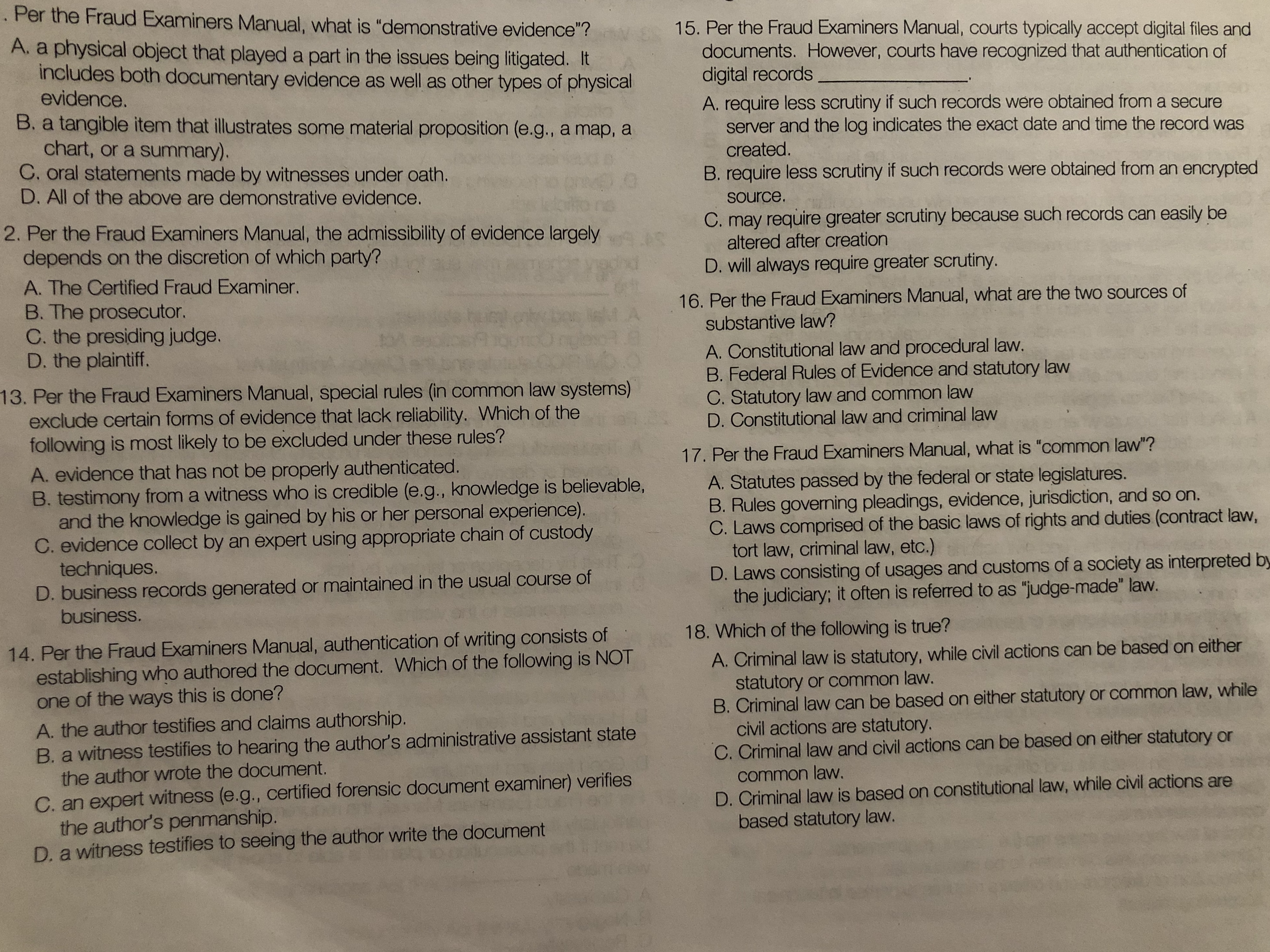i need help answering this questions. I have attached a pic of the questions, they are suppose to be from the fraud examiners manual, but I can't really find the answer for them.
. Per the Fraud Examiners Manual , what is " demonstrative evidence " ?\\ 15 . Per the Fraud Examiners Manual , courts typically accept digital files and A. a physical object that played a part in the issues being litigated . It documents . However , courts have recognized that authentication of includes both documentary evidence as well as other types of physical digital records evidence . A. require less scrutiny if such records were obtained from a secure B. a tangible item that illustrates some material proposition ( e. g., a map , a server and the log indicates the exact date and time the record was chart , or a summary ) . created . C. Oral statements made by witnesses under oath B. require less scrutiny if such records were obtained from an encrypted D. All of the above are demonstrative evidence . source . 2 . Per the Fraud Examiners Manual , the admissibility of evidence largely C. may require greater scrutiny because such records can easily be depends on the discretion of which party ?" altered after creation D. Will always require greater scrutiny . A . The Certified Fraud Examiner . B . The prosecutor . 16 . Per the Fraud Examiners Manual , what are the two sources of C. the presiding judge substantive law ? D. the plaintiff . A . Constitutional law and procedural law ." B. Federal Rules of Evidence and statutory law 13 . Per the Fraud Examiners Manual , Special rules ( in common law systems ) C. Statutory law and common law exclude certain forms of evidence that lack reliability . Which of the D. Constitutional law and criminal law following is most likely to be excluded under these rules ?" A . evidence that has not be properly authenticated ." 17 . Per the Fraud Examiners Manual , what is " common law " ? B. testimony from a witness who is credible ( e . g., knowledge is believable, A . Statutes passed by the federal or state legislatures . and the knowledge is gained by his or her personal experience ) B. Rules governing pleadings , evidence , jurisdiction , and so on . C. evidence collect by an expert using appropriate chain of custody C. Laws comprised of the basic laws of rights and duties ( contract law , techniques . tort law , Criminal law , etc . )| D. business records generated or maintained in the usual course of D. Laws consisting of usages and customs of a society as interpreted by the judiciary ; it often is referred to as " judge-made " law ." business . 14 . Per the Fraud Examiners Manual , authentication of writing consists of 18 . Which of the following is true ?" establishing who authored the document . Which of the following is NOT A . Criminal law is statutory , while civil actions can be based on either one of the ways this is done ? statutory or common law . B. Criminal law can be based on either statutory or common law , while* A . the author testifies and claims authorship . B. a witness testifies to hearing the author's administrative assistant state civil actions are statutory .\\ C. Criminal law and civil actions can be based on either statutory or the author wrote the document . C. an expert witness ( e. g., certified forensic document examiner ) verifies common law ." D. Criminal law is based on constitutional law , while civil actions are* the author's penmanship .* based statutory law . D. a witness testifies to seeing the author write the document







